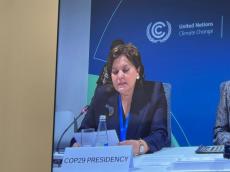|
|
TODAY.AZ / Business
Azerbaijani minister addresses critical issues of Climate, Nature, and Indigenous Rights
21 November 2024 [15:35] - TODAY.AZ

By Nazrin Abdul
Azerbaijan's Minister of Ecological and Natural Resources, Umayra Taghiyeva, delivered a compelling address at the third high-level event of the RioTrio initiatives at COP29, which focused on the urgent intersections of forests, climate, nature, and biodiversity.
Her speech highlighted the importance of synergy between global environmental frameworks and underscored the role of indigenous communities, gender equality, and sustainable land management in combating climate change.
In her speech, Minister Taghiyeva emphasized the significance of collaborative action across the three core environmental conventions—the UNFCCC, the Convention on Biological Diversity (CBD), and the UN Convention to Combat Desertification (UNCCD)—which she described as the Rio Conventions. The partnerships forged through these agreements are not just technical but political, symbolizing a unified front in the global fight against environmental degradation.
"I am honored to stand with you today as we confront the intertwined challenges of climate change, biodiversity loss, and land degradation," said Minister Taghiyeva. "The RioTrio initiatives offer a platform for collective action. We are not just addressing individual issues in isolation. We are working together to bring about comprehensive solutions that benefit people, nature, and the climate."
Taghiyeva also took the opportunity to thank the Republic of Colombia and the Kingdom of Saudi Arabia for their partnership in hosting the event, noting that the success of the RioTrio initiatives depends on the strength of these alliances.
A key component of her address was the need for harmonized data and knowledge sharing among countries, institutions, and conventions. Minister Taghiyeva emphasized that aligning data-sharing systems could enable nations to track progress in climate action, biodiversity preservation, and land restoration more efficiently. She argued that simplifying reporting processes, reducing duplications, and aligning indicators across conventions would lead to better-informed decision-making and foster stronger accountability.
She also spotlighted the value of indigenous knowledge in shaping solutions that are not only scientifically sound but also socially and culturally relevant. Taghiyeva called for the integration of local and indigenous communities' insights into global data systems, underscoring their role in developing effective, context-specific solutions to environmental challenges.
“Indigenous peoples are the guardians of vast, critical ecosystems, and their perspectives should be at the heart of our strategies,” she said. “Their deep knowledge of the land is indispensable for ensuring that our policies are both meaningful and impactful."
The Minister concluded her remarks with a call to action, urging all delegates and participants to contribute their ideas creatively and to think beyond traditional silos. She reminded the gathering that the Sustainable Development Goals (SDGs) cannot be achieved through isolated efforts, but rather through integrated solutions that combine efforts across conventions, sectors, and regions.
"The challenges are enormous," Taghiyeva stated, "but the opportunity to act is even greater. Together, we can create a sustainable future for our planet and its people."
As COP29 moves into its final days, discussions are expected to deepen on how to enhance global coordination to address the interconnected crises of climate change, biodiversity loss, and land degradation.
URL: http://www.today.az/news/business/254988.html
 Print version
Print version
Connect with us. Get latest news and updates.
See Also
- 27 January 2025 [15:40]
Reconstruction work launches in Zangilan's Jahangirbeyli village - 27 January 2025 [14:21]
Azerbaijan's Macroeconomic Sustainability Working Group evaluates 2024 progress - 27 January 2025 [08:30]
Azerbaijan’s evolving role in global energy: Oil, gas, and renewable energy collaborations - 26 January 2025 [10:00]
Azerbaijan's gas can supply Ukraine and Europe, says Zelensky - 26 January 2025 [09:00]
Azerbaijan sees significant increase in international air cargo transportation in 2024 - 24 January 2025 [15:43]
Baku to host 71st UN Tourism Regional Commission session - 24 January 2025 [14:38]
bp to build new platform on Shah Deniz field - 24 January 2025 [12:27]
SOCAR explores cooperation with Oliver Wyman Group on energy innovation - 24 January 2025 [11:43]
Azerbaijan advances risk management to combat financial crime - 23 January 2025 [15:14]
Azerbaijan involves 13,000 people with disabilities in employment programs
Most Popular
 Project without demand: why the Crossroads of the World is not interested in Europe
Project without demand: why the Crossroads of the World is not interested in Europe
 MFA congratulates Australia on national holiday
MFA congratulates Australia on national holiday
 Azerbaijan’s evolving role in global energy: Oil, gas, and renewable energy collaborations
Azerbaijan’s evolving role in global energy: Oil, gas, and renewable energy collaborations
 Armenia's geopolitical gamble risks regional stability as Yerevan plays both sides
Armenia's geopolitical gamble risks regional stability as Yerevan plays both sides
 Azerbaijan's gas can supply Ukraine and Europe, says Zelensky
Azerbaijan's gas can supply Ukraine and Europe, says Zelensky
 Defense Ministry holds training-methodical session [PHOTOS]
Defense Ministry holds training-methodical session [PHOTOS]
 Tehran's mixed signals and impact on relations with Baku [ANALYSIS]
Tehran's mixed signals and impact on relations with Baku [ANALYSIS]
